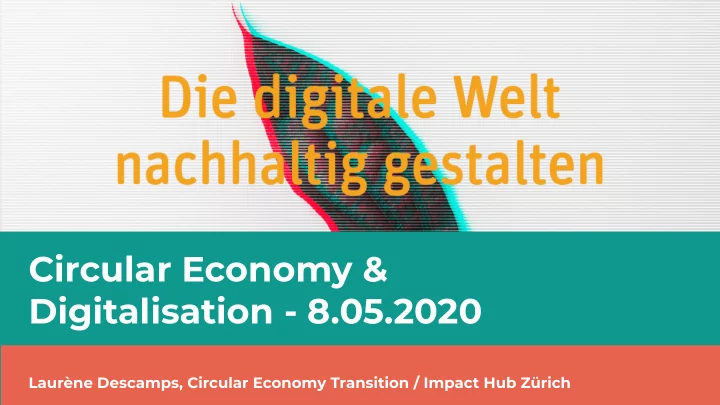

Circular Economy & Digitalisation - 8.05.2020 Laurène Descamps, Circular Economy Transition / Impact Hub Zürich
What Is Circular Economy A Circular economy is a powerful method consisting of principles and activities that aims to retain the value of resources, materials, components and products for as long as possible in the economy. This is done by narrowing – slowing – closing – and regenerating material and energy loops. It is a systemic approach which serves the purpose to reduce the consumption of natural resources and to contribute to sustainable development . - Circular Economy in a nutshell by CET
BUSINESS MODELS ACTIVITIES PRINCIPLES MINDSET CE BUILDING BLOCKS
Circular Economy Transition Tomorrow’s economy is circular. Implementing partners Implementing partners Funding partner Initiative Funding partner Part of the
CE Ecosystem ● Building Circular Economy CE Incubator ● Circular Business ● Transition Lab Tomorrow’s economy CE Policy ● is circular. recommendation Implementing partners Implementing partners Funding partner Initiative Funding partner Part of the
Digitalisation as a Circular Economy Transition enabler → Information, Transparency, Coordination, Innovation, Incentive
Information about… ● Availability of resources, materials & products ● Composition and resource components ● Quantities and costs → Ai, Big Data, automatization, Industry 4.0
Transparency on… ● Quality of the ressources ● Wear of products and materials ● Associated Co2 emissions and ecological footprint (over the whole life cycle) ● Reusability and “take back systems” → Sensoring, Automatization, Cyber physical systems, artificial intelligence, QR codes iCEEP
Coordination… Through Collaborative platforms: ● - between industries (secondary raw materials markets, logistical optimisation) - between businesses and consumers (second hand markets, Food waste apps) - between users (carsharing, Airbnb, etc) → Platform solutions, social medias, sensoring, data analytics, instant information, etc Leasing jeans, leasing phones, share energy(EXNATON), etc.
Innovation and new business models… Product-as-a-service systems (eg. “pay per use”) ● Open source platforms (repair,build) ● Personalized offers for more customer satisfaction ● Data collection to improve products and user ● interactions → Sensoring, Artificial intelligence, platform solutions
Incentives for a Circular economy... Reward systems for material & product reuse ● Cost saving & business opportunities ● Improved/longer relationship with customers through ● additional services (repair, take back, bonus systems, etc) Improved perception for secondary materials and ● products → Virtual currency, bitcoins, platform solutions, QR codes, sensoring, social media, etc
Challenges of digitalization ● Data ownership ● Data sharing ● Trust ● Lack of institutional support and incentives ● Collaboration along value chain, new mindset ● SMEs often behind (in regards to digitalisation) but representing majority of businesses in Switzerland ● Right competencies
How sustainable can a digital world really be?
Exponential growth in network traffics, energy consumption, data storage and device production Business-as-usual Arte TV, le dessous des cartes Today Adapted from Hugues Ferreboeuf, Towards digital sobriety Data center, Siemens
Digital Sobriety and Low Tech as a solution - Raise user awareness about actual digital overconsumption - Question digital needs & advantages - Systematically link digitalisation with sustainability (ioT, etc) - Regulate the use of addictive design techniques used by dominant digital player (GAFAM, BATX) - Show the potential of Low tech approaches to businesses as well as authorities and governments
Next opportunity to engage
THANK YOU
ANNEXE
Challenge on startup levels ● Digitalisation enables exact tracking of energy generation by households Enables possibility to share local ● energy with neighbours and thus limiting transport costs ● Regulation challenge: no actual incentive allowed for sharing local renewable energy
Circular Economy Transition Activities
CE Ecosystem building 150+ Circular Economy Events around different topics, industries, formats throughout Switzerland Networking and pitching opportunities for startups and SMEs Stakeholder events to share experiences & CE knowledge Learn about Circular Economy framework and pionier projects!
Ecosystem building events
Circular economy Business Lab Core group - 5 Months of transformational journey towards circular economy business models Workshops - Deep dive into circular economy building blocks Clusters - focus groups on specific sectors and themes Tailored consulting - let’s develop circular economy together!
Circular economy Incubator 3 Months Program Accelerating circular ideas and proof of concepts through a combination of different support elements. 25+ Ventures swiss-wide Implementing circular solutions with the support of mentors and experts out of the Swiss innovation ecosystem. 1 Cohort per city Bern, Geneva, Lausanne and Zurich
2020 Cohort iCEEP AND MANY MORE...
CE Policy recommendations Allowing Circular Economy partners to: Participate in the elaboration of policy recommendations directly linked with their business activities and the Swiss context Influence the regulatory environment in Switzerland and access key decision makers
Partner organisations INITIATED AND LED BY FOUNDING PARTNER NATIONAL PARTNERS KNOWLEDGE PARTNERS ECOSYSTEM PARTNERS AND MANY MORE...
Recommend
More recommend